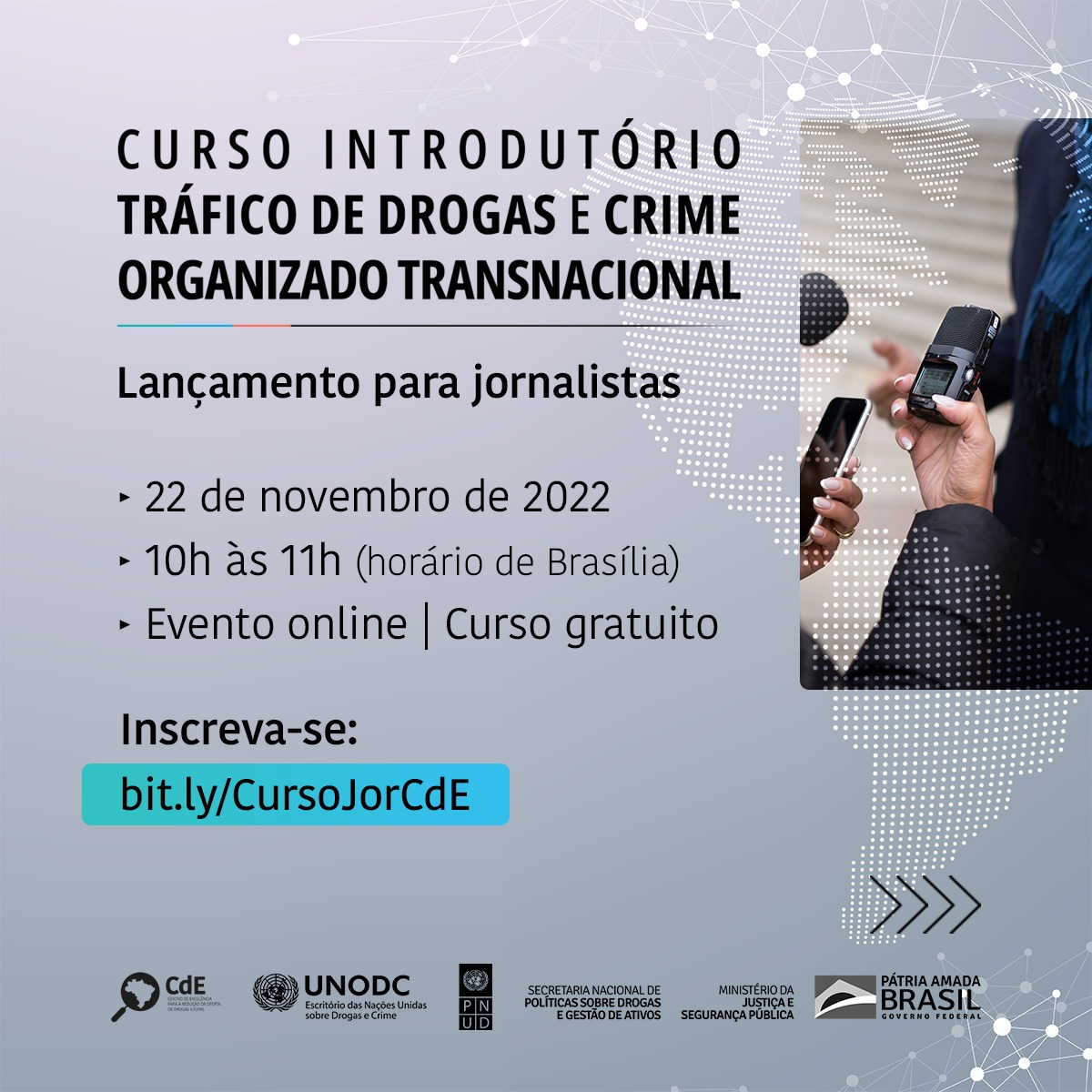
Brasilia, 14 November, 2022 - The access to reliable information and updated data from national and international analyses is essential to support research work. Aiming to contribute in this context, specifically compiling information about the panorama of research on the issue of drug trafficking, the Center of Excellence for Drug Supply Reduction (CdE) launches, on 22 November , the "Introductory Course on Drug Trafficking and Transnational Organized Crime". The CdE is the result of a partnership among the National Secretariat of Drug Policy and Asset Management of the Ministry of Justice and Public Security (Senad/MJSP), the United Nations Development Programme (UNDP) and the United Nations Office on Drugs and Crime (UNODC).
Divided into three modules, with about 2 hours duration, the course presents basic concepts on drug trafficking and transnational organized crime, data and information on the illicit drug market and, also, trends in the illicit drug market, addressing, including, the impacts of the pandemic of covid-19 on this dynamic. All content will be available on UNODC's online platform, Global eLearning, and those who attend will receive a certificate of completion.
The course will be launched in an online event specially targeted at journalists, on 22 Nov, at 10 am, via the Teams platform. Registration can be made HERE. Soon after the launch, registration for the course itself will be open.
Themes and topics
Module 1, "Introduction to the topic of drug trafficking and transnational organized crime", addresses the main international agreements to which Brazil is a signatory; Brazilian drug policy legislation; Illicit financial flows and Brazil's challenges in the transnational drug market; data on drug supply in Brazil and regionally; New Psychoactive Substances (NPS) and how the Early Warning Systems operate; how Brazilian authorities respond to cross-border crimes related to drug trafficking; and how assets seized from drug trafficking are managed and used to finance public policy on drugs in Brazil.
The indicator that aims to reduce illicit financial flows within the Sustainable Development Goals (SDGs) of the UN Agenda 2030 is also mentioned in the course. It is worth remembering that within SDG 16 (Peace, Justice, and Effective Institutions), there is target 16.4, which foresees, by 2030, significantly reducing illicit financial and arms flows, strengthening the recovery and return of stolen resources and combating all forms of organized crime.
In Module 2 of the course, the focus is on the production and analysis of data and statistics on the illicit drug market by institutions worldwide. From a global perspective, the participant will be able to identify the scenario of trends that surround Brazil, knowing in which sources they can seek reliable information on the subject. One of the most comprehensive references on drugs in the world is the World Drug Report, developed by UNODC. In the 2022 edition, the document presented an overview of the supply and demand of opioids, cocaine, cannabis, New Psychoactive Substances (NPS), as well as the impact of trafficking on the environment.
This module also deals with Cocaine Insights, a series produced by UNODC and Europe. The fourth edition of the report, developed by the UNODC Research and Trends Analysis Department (Vienna) in partnership with the CoE, focused on the analysis of data from Brazil and countries involved in cocaine trafficking in the transatlantic region.
CoE in Brazil
The work of the CoE in Brazil is also detailed in Module 2. With the proposal to contribute with qualified information on the supply of illicit drugs in the country, through the sharing of scientific evidence on illicit markets, the Center relies on the expertise of UNODC headquarters in Vienna and offices in several countries to strengthen the statistical and analytical capabilities of public security and draw international cooperation strategies on the subject.
The course also presents and offers access to important materials already produced by the CoE, such as the thematic bulletins entitled "Asset Management of Drug Trafficking - Decapitalization of organized crime to strengthen public policies in Brazil" and "Monitoring Prices of Illicit Drugs: Lessons learned in Colombia and possible challenges in Brazil"; and the strategic study "Covid-19 and drug trafficking in Brazil: the adaptation of organized crime and the actions of law enforcement in the pandemic".
Trends
How did organized crime adapt to the Covid-19 pandemic in Brazil? What are the main illicit substances detected in Brazil? What are the differences between actors in the illicit drug market and what factors influence the variation of drug prices? These are some of the questions addressed in Module 3 of the course.
Service
Launch of the introductory course on drug trafficking and transnational organised crime
Date: 22/11/2022
Time: 10 a.m.
Streamed live on the Teams platform. To register for the event and guarantee your place, click HERE.